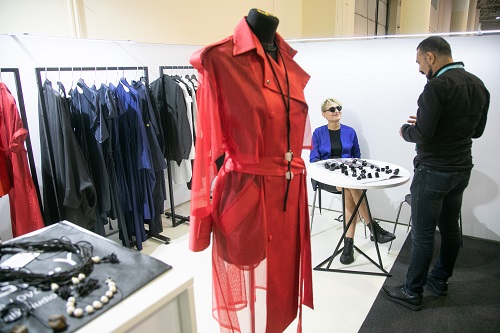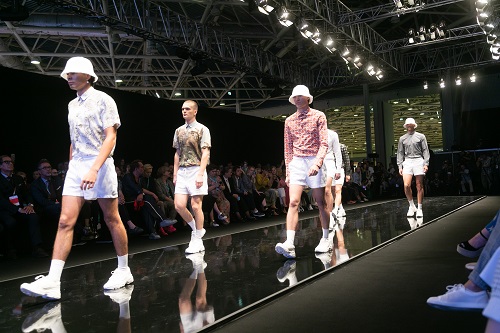FW
At the 34th edition of CPM – COLLECTION PREMIÈRE MOSCOW from 24-27 February 2020, around 1,300 brands from 30 countries will be showcasing their autumn/winter 2020/21 collections on the exhibition grounds of Moscow’s Expocentre. An average of 20,000 buyers from Russia and the Eurasian Economic Union use CPM as a valuable source of information and inspiration for doing business and placing orders. “Due to the currently stagnating disposable income of its consumers, the Russian market is regarded as challenging – yet still lucrative. Its core appeal is still the prevailing mindset that fashion is a strong statement of people’s desire to convey a positive image in their working, leisure and social lives. At the 34th edition of CPM, professional buyers will be presented with a wide offer tailored specifically to them, without any decreases in space or exhibitor numbers: CPM stands for Collection, Premiere, Moscow – and a whole lot more!” - Thomas Stenzel, Managing Director of OOO Messe Düsseldorf Moscow.

At the beginning of the new decade, the biggest Eastern European ordering platform for the fashion industry, organised by Messe Düsseldorf Moscow in partnership with IGEDO Company and Messe Düsseldorf, is all about renewal and change. With its various segments and areas, CPM covers the entire fashion spectrum and presents collections from ladies’, men’s and kidswear brands alongside lingerie, beach, sports and yogawear, shoes, accessories and fabrics. “My team and I are proud to once again be attracting many international participants to CPM. The response from the companies shows that the Russian market is still vital to their turnovers. Our regular exhibitors and the many new additions are well prepared for taking part in the fair and looking forward to a successful ordering season and the opportunity to make new contacts.” - Christian Kasch, Project Director of CPM International.”

Highlights of the Show
• Change and renewal at the focus
• Large number of international exhibitors with growth rates of up to 10 percent
• New: ‘Labels to Watch’ in cooperation with TextilWirtschaft magazine
• RFRF: Additional presentations, panels and seminars on relevant industry topicsq
• ‘CPM Body & Beach’ with approx. 135 international brands and separate line-up
• ‘CPM Shop & Retail Solutions’ with leading suppliers
• Interactive trend zone, media partnerships, new catwalk shows
The National Council of Textile Organizations (NCTO), representing the full spectrum of U.S. textiles from fiber through finished sewn products, issued a statement on the Trump administration’s announced action plan to increase enforcement and penalties against counterfeit goods sold online and imported to the U.S.
“This is a very important and long overdue move on the part of the administration to increase enforcement activity and penalties against counterfeit goods sold online and imported into the United States,” said NCTO President and CEO Kim Glas. “We commend the administration for making a commitment to bolster efforts to crack down on counterfeits, particularly in the textile and apparel sector, which has been hit hard by fake imported products for decades.”
Nearly two million shipments of goods are exported to the United States duty free each day-- often from countries with poor labor, human rights and environmental track records—under a provision known as Section 321 de minimis. This provision allows goods valued below an $800 threshold to enter the U.S. duty free when imported directly to an individual on a single day.
“This massive increase in de minimis shipment trade poses significant security risks and threats to public health and safety, while incentivizing customs fraud and creating a loophole to our entire tariff structure,” Glas said. “Our concerns regarding the de minimis loophole are exacerbated by the belief that the domestic textile industry and other U.S. manufacturing interests are directly and negatively impacted, particularly since e-commerce sites like Amazon and others are using de minimis as a duty-free portal into the U.S. for products under $800.”
Furthermore, CBP’s own annual report on intellectual property seizures, including large volumes of counterfeits, revealed that U.S. authorities made seizures totaling $1.4 billion in fiscal 2018.
Chinese products accounted for 46% of all IPR seizures. Apparel and accessories were the top counterfeit products seized by U.S. authorities, accounting for 18% of all seizures in FY 2018.
“We think this is an important step forward by the administration to deepen the analysis on de minimis products--- that are often not thoroughly examined and undercut our domestic manufacturing industries,” Glas said. “We don’t know what the products are, where they are coming from, whether they meet U.S. safety requirements, who is making them or the country of origin. We believe it is long past time for the administration to address the issue of de minimis shipments and counterfeiting head on.”
Salvatore Ferragamo S.p.A. is the parent Company of the Salvatore Ferragamo Group, one of the world's leaders in the luxury industry and whose origins date back to 1927. The Group is active in the creation, production and sale of shoes, leather goods, apparel, silk products and other accessories, along with women's and men's fragrances. The Group's product offer also includes eyewear and watches, manufactured by licensees.
The Salvatore Ferragamo Group released the Group’s Preliminary Consolidated Revenues for Fiscal Year 2019.
As of 31 December 2019 the Salvatore Ferragamo Group reported Total Revenues of 1,377 million Euros up by 2.3% at current exchange rates (+1.3% at constant exchange rates) vs. the 1,347 million Euros recorded in FY 2018. Revenues in 4Q 2019 registered a 2.1% increase at current exchange rates and remained stable (-0.1%) at constant exchange rates.
Among the product categories, at constant exchange rates, footwear was up 3.0%, handbags and leather accessories 2.8%, while fragrances were down 7.9%, vs. FY 2018.
"The current retail ecosystem, that ensures doorstep delivery of all customer choices, has turned the tables for the e-commerce sector significantly. It has made shopping a virtual experience for millennials with mobile becoming the most preferred mode. Online movie sites, OTT solutions, social media platforms, aggressive influencer marketing campaigns, and vernacular content seeding has increased the use of online platforms for ordering products and services."
 The current retail ecosystem, that ensures doorstep delivery of all customer choices, has turned the tables for the e-commerce sector significantly. It has made shopping a virtual experience for millennials with mobile becoming the most preferred mode. Online movie sites, OTT solutions, social media platforms, aggressive influencer marketing campaigns, and vernacular content seeding has increased the use of online platforms for ordering products and services. Some of key online trends that will rule in the coming year include:
The current retail ecosystem, that ensures doorstep delivery of all customer choices, has turned the tables for the e-commerce sector significantly. It has made shopping a virtual experience for millennials with mobile becoming the most preferred mode. Online movie sites, OTT solutions, social media platforms, aggressive influencer marketing campaigns, and vernacular content seeding has increased the use of online platforms for ordering products and services. Some of key online trends that will rule in the coming year include:
Customisation: Customisation helps brands entice customers to shop for their products. Brands are innovating their products by leveraging their consumer’s feedback in designing, features, usability, etc. A similar level of spontaneity can be seen from grocery shopping to checking travel plans to buying insurance products online.
leveraging their consumer’s feedback in designing, features, usability, etc. A similar level of spontaneity can be seen from grocery shopping to checking travel plans to buying insurance products online.
Convenience of shopping: Convenience has become an important factor for users in choosing brands and products. Shorter delivery times, delivery slot options, flexible payment options, choice of shipment locations, easy returns, seamless servicing, swifter ways of query resolution, live-assistance, etc are impacting consumer’s purchasing behavior. In turn, this is creating opportunities for entrepreneurs to create a market for newer products purely based on consumers’ needs. ‘
Social commerce drives purchases: Inspirational blogs, celebrity engagement posts, live videos, and fashion information are driving people to buy products online with recommendations and suggestions from their friends. Consumers are spending more time on tiny little screens to watch the live premier of product tutorials by a well-known celebrity on social media, ‘DIY’ videos on OTT platforms and share their personal shopping experience on online network groups. This is affecting the supply chain, marketing, distribution, product innovation cycle hence, revolutionising the entire customer shopping experience.
Smart mirrors serve as changing rooms: Serving as virtual changing rooms, smart mirrors will enable customers to try new outfits without actually putting them on but will also be able to share their virtual image on social media to take suggestions from friends before buying a product.
Apart from these, there will be massive changes in the traditional retail industry. Shopping stores will function like websites and websites will function more like stores. Robot shopping assistants like Spod, Budgee, etc will aid in management of supply chain, check product stock, find pricing errors and lookout for misplaced products. If an in-store customer has any question beyond a shopping assistant, the consumer can start video conferencing with a human assistant further deepening the human-machine partnership.
Alongwith these, the invasive trends of AI, VR and augmented reality coupled with a high-tech 5G network infrastructure will revolutionise shopping experience for Indian consumers.
 KARL MAYER (CHINA), the subsidiary of the renowned KARL MAYER Group celebrated its 25th anniversary. The company-wide event was held in Changzhou. The entire workforce and management representatives from Germany, Hong Kong and Japan – including CEO Arno Gärtner – all took part in the festivities.
KARL MAYER (CHINA), the subsidiary of the renowned KARL MAYER Group celebrated its 25th anniversary. The company-wide event was held in Changzhou. The entire workforce and management representatives from Germany, Hong Kong and Japan – including CEO Arno Gärtner – all took part in the festivities.
Way back when it all began, there was a vision: a belief that China would one day become the world’s most important market, Arno Gärtner recalled when reminiscing about the early days. Building on this belief, WUJIN Textile Machinery Co Ltd was founded in 1995 as a joint venture with a Chinese partner. Just four years later, KARL MAYER acquired all of the shares in the joint venture. Together with NIPPON MAYER, the manufacturer set up KARL MAYER Textile Machinery Ltd as its own entity in Changzhou, and in 2005 formed KARL MAYER (CHINA) Ltd. A phase of continual expansion followed.
In 2011, the production of knitting machines was expanded to include the manufacture of warp preparation equipment and in the following year,
“There is no doubt that KARL MAYER’s success over the last 15 years is largely down to KARL MAYER (CHINA),” said Arno Gärtner at the anniversary celebrations.
In order to operate at an even closer proximity to customers in the main Chinese market, the significance of the subsidiary in Changzhou will continue to grow. Over the past 10 years, an enormous capacity for textile production has been established in China. At the moment, however, China’s geopolitical situation has led to slow growth. “As the market leader, we want to be the first to recognise market developments and respond with more innovative solutions offering maximum customer benefit based on buyers’ requirements”, said Arno Gärtner.
Fig. (from left to right, foreground): Yang Zengxing, General Manager of KARL MAYER (CHINA) as well as Arno Gärtner, CEO, and Roland Kohn, member of the extended KARL MAYER management team cut the birthday cake
India is upgrading the leather sector. Over 494 proposals for modernisation, technology upgradation and capacity expansion in leather and leather products manufacturing units have been received. Out of this, 166 proposals have already been approved involving total investments of Rs 285.67 crores. Another 83 proposals involving a total investment of Rs137.02 crores are under final scrutiny and expected to be placed before the competent authority for approval very soon.
Upgradation projects for 11 common effluent treatment plants in Tamil Nadu have already been approved involving a combined total project cost of Rs 506.47 crores. The execution of these sanctioned projects is in full swing during the current fiscal. A new greenfield mega cluster is coming up in Andhra Pradesh in an area of 537 acres. A brownfield project is coming up in Kolkata spread over an area of 108.07 acres. Approval has been given for a new cluster in Maharashtra.
In order to enhance production levels, infrastructure in the existing leather, leather products and footwear clusters will be upgraded. There is a proposal to create new clusters with plug-and-play model of factories in order to attract domestic and foreign investments, considering the huge cost of land for setting up new projects.
San Diego’s Genomatica has produced the first ton of a key ingredient for nylon-6, made from plants instead of crude oil. The bio-based nylon could potentially reduce greenhouse-gas emissions in a $10 billion global industry that churns out more than 5 million tons of nylon-6 each year for carpeting, clothing, car interiors, engineered plastics and food packaging.
Genomatica uses an engineered microorganism and production process to ferment sugars found in plants to make the chemical intermediate for nylon-6. The chemical can then be converted into nylon-6 polymer chips and yarns by Aquafil in Slovenia.
The company’s technology, which was recognised by Time as one of the best inventions of 2019, is underpinned by the process of fermentation. Genomatica uses an engineered microorganism and production process to ferment sugars found in plants to make the chemical intermediate for nylon-6. The chemical can then be converted into nylon-6 polymer chips and yarns by Aquafil in Slovenia.
Welspun believes its flooring business will be a game-changer in India. The business will offer stone polymer composite luxury performance tiles, carpet tiles, wall-to-wall carpets and artificial grass. This will provide convenience and customisation to customers and stakeholders such as contractors and distributors. The company’s flooring plant in Hyderabad is spread over 27 million square meters. The new vertical is expected to generate sales of around Rs 100 crores in the current financial year. The tile market in India is worth Rs 35,000 crores. The flooring business is expected to help Welspun grow in double digits.
Welspun is the world’s largest maker of terry towels. Welspun is going into advanced textiles.The big bet on advanced textiles includes making disposable towels out of non-woven textiles and filters for the auto and power sector. Advanced textiles will broadbase Welspun’s clientele by adding sectors such as auto, healthcare and FMCG. The company is known for bed sheets and towels and has introduced reversible bed sheets and quick-dry towels. It is one of the largest suppliers of home textiles to retailers like Walmart, Costco and others. The company also sells premium licensed brand products like Wimbeldon, Nickelodeon and Disney. Branded products account for 17 per cent of its revenues.
By signing a series of free trade agreements, Vietnam hopes to create a large playing field for its textile and garment enterprises. Among these are: the EU-Vietnam Free Trade Agreement (EVFTA) and the CPTPP (Comprehensive and Progressive Agreement for Trans-Pacific Partnership) bloc. Vietnam’s fabric and yarn enterprises are waiting for EVFTA to take effect to boost exports to the EU. The agreement stipulates strict requirements of product origin in order to enjoy trade preferences. Textile and garment exports to the EU must be produced with fabrics made in Vietnam, and tailored in Vietnam or Europe. According to the CPTPP, all three production stages of fabric spinning, knitting and completion must be done in a CPTPP country. This requires Vietnam to build a domestic textile and garment material supply chain.
The textile and garment industry is stepping up its sustainable development strategy implementation to meet the requirements of major foreign markets. Manufacturers in the sector have applied advanced science and technology to green the industry, apart from training human resources.
Vietnam’s earnings from textile and garment exports have grown 10.19 per cent. Vietnam is the biggest textile and garment exporter in Asean (the Association of Southeast Asian Nations). The US is the largest importer of Vietnamese textiles and garments, followed by the EU and China.
Denim Premiere Vision was held in the UK, December 3 to 4, 2019. The major theme at the event was environmental sustainability and almost all the exhibitors presented innovations which reflected this theme. The exhibitors represented approximately 33 per cent of the denim industry and, perhaps more significantly, 90 per cent of the premium denim industry. Many exhibitors advertised key products certified as compliant with various environmental standards. A trend area hosted design trends for the spring/summer 2021 season.
Bossa, a Turkey-base denim manufacturer, presented a range of fabrics made using recycled organic cotton, Tencel Lyocell fiber with Refibra technology and Lycra T400 fiber with EcoMade technology. Naveena Denim, a denim manufacturer based in Pakistan, presented a fabric called Hemp Denim. The fabric is made using hemp fiber and its manufacture consumes 70 per cent less water than the manufacture of cotton fabric. KilimDenim, a denim manufacturer based in Turkey, presented its Cactus indigo dyeing technology, which is designed to reduce the amount of water consumed during the indigo dyeing process, particularly during the rinsing stage.
Innovation in environmental sustainability will be a major focus for the denim industry looking ahead. In particular, organic fibers, recycled fibers and recycled materials will be key ingredients for use in the manufacture of denim in the future.












